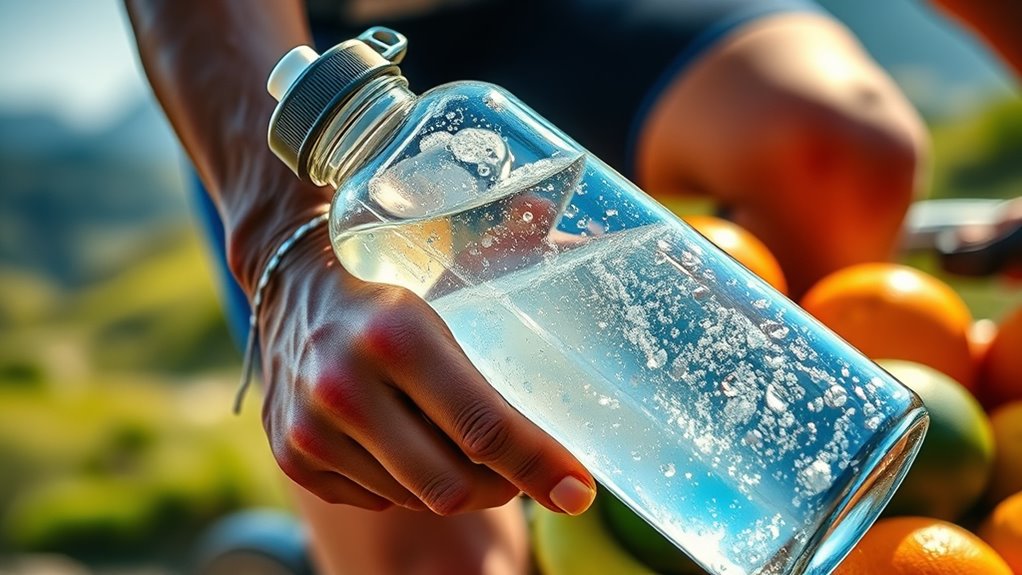In endurance sports, electrolytes like sodium, potassium, and magnesium play vital roles in keeping your body hydrated, supporting muscle function, and preventing cramps. Sodium helps maintain fluid balance and nerve signals, while potassium is key for muscle contractions and nerve transmission. Magnesium promotes energy production and muscle relaxation. Staying balanced with these minerals improves performance and speeds recovery. Learn more about how to optimize your electrolyte intake for endurance success.
Key Takeaways
- Sodium maintains fluid balance, nerve function, and prevents dehydration during prolonged endurance activities.
- Potassium is essential for muscle contractions and nerve signal transmission, supporting muscle performance.
- Magnesium facilitates energy production, muscle relaxation, and reduces cramps and spasms.
- Electrolyte imbalances can cause dehydration, cramps, fatigue, and impaired muscle function.
- Proper intake of electrolytes through diet and hydration enhances endurance, recovery, and overall performance.
The Function of Sodium in Endurance Activities

Sodium plays a crucial role in maintaining fluid balance and nerve function during endurance activities. It helps regulate sodium levels in your body, ensuring proper hydration and preventing dehydration. When you sweat, you lose sodium, which can disrupt electrolyte absorption and lead to cramping or fatigue. Your body relies on sodium regulation to keep muscle and nerve cells functioning correctly, supporting smooth communication between nerves and muscles. Proper sodium intake during prolonged exercise helps sustain performance by maintaining blood volume and preventing hyponatremia. By balancing sodium levels, you optimize electrolyte absorption, which is essential for endurance. Staying aware of your sodium needs allows you to prevent imbalances that could impair your athletic output and recovery, keeping you performing at your best. Additionally, understanding the benefits of electrolyte balance can help you tailor your hydration strategy for optimal results. Maintaining appropriate sodium levels is especially important for individuals with certain risk factors that may predispose them to imbalances. Proper management of sodium is also supported by regular air purifier maintenance, which ensures optimal indoor air quality to support overall health and performance.
How Potassium Supports Muscle and Nerve Function

Potassium is vital for proper muscle contractions and nerve signal transmission, making it essential during endurance activities. Adequate potassium absorption ensures your muscles function smoothly and efficiently. It helps maintain the balance of electrolytes inside and outside your cells, which is indispensable for nerve signals to travel correctly. When potassium levels are ideal, nerve signal transmission occurs seamlessly, allowing your muscles to respond quickly and precisely. This coordination reduces fatigue and supports sustained performance. Conversely, low potassium levels can impair muscle contractions and slow nerve responses, increasing the risk of cramps and weakness. During endurance sports, replenishing potassium through diet or supplements helps keep your nerve and muscle functions on point, ensuring you stay strong and responsive throughout your activity. Additionally, maintaining electrolyte balance is crucial for overall hydration and performance. Proper electrolyte balance is also important for maintaining muscle function, especially during prolonged physical exertion.
The Role of Magnesium in Energy Production and Muscle Relaxation

Magnesium plays a crucial role in energy production and muscle relaxation, supporting your performance during endurance activities. Proper magnesium absorption ensures your body efficiently uses this mineral for energy metabolism, fueling your muscles when you need it most. Without enough magnesium, your muscles may cramp or fatigue more quickly, hindering your performance. Here’s how magnesium enhances your endurance:
- Facilitates ATP synthesis, the energy currency your body relies on
- Promotes muscle relaxation, reducing cramps and spasms
- Supports nerve function, helping you maintain coordination
Maintaining ideal magnesium levels is essential for sustained energy and smooth muscle function during prolonged exercise. By focusing on magnesium-rich foods and hydration, you can maximize absorption and boost your energy metabolism, keeping you strong from start to finish.
Signs of Electrolyte Imbalance During Exercise

Electrolyte imbalances can quickly become noticeable during exercise, signaling that your body’s fluid and mineral levels are out of sync. You might notice dehydration symptoms like dry mouth, dizziness, or dark urine, which indicate your body is losing too much water and electrolytes. Muscle cramps are another common sign, often a result of inadequate cramp prevention due to low sodium, potassium, or magnesium levels. These cramps can occur suddenly and be quite painful, disrupting your activity. Pay attention to these warning signs, as they suggest your electrolyte balance needs attention. Staying hydrated with electrolyte-rich fluids can help maintain proper mineral levels, supporting muscle function and preventing dehydration symptoms during your endurance efforts. Additionally, understanding the best electrolyte sources can help you choose the right foods and drinks to replenish lost minerals effectively. Using the right filtration and pump protection techniques can also ensure your hydration supplies remain free of contaminants, optimizing electrolyte intake.
Strategies for Replenishing Sodium, Potassium, and Magnesium

To effectively replenish sodium, potassium, and magnesium during endurance activities, you need to incorporate targeted strategies into your hydration routine. Electrolyte supplementation is key to maintaining balance and preventing deficits. Focus on customizing hydration strategies based on your sweat rate, intensity, and duration. Consider these approaches:
- Use electrolyte-enhanced drinks formulated specifically for endurance sports
- Incorporate electrolyte tablets or powders into water during long sessions
- Monitor your sweat loss to adjust intake and avoid over- or under-hydration
- Be aware of the history of pinball machines to understand how technological progress has influenced modern electronic components in electrolyte supplements. Additionally, understanding the types of electrolytes involved can help optimize your replenishment plan, especially since the composition of electrolytes can vary depending on the manufacturing processes used.
Food Sources Rich in Key Electrolytes

While supplements and drinks are helpful during prolonged activity, getting electrolytes from whole foods can also support your hydration strategy. You can find electrolyte-rich snacks that naturally supply sodium, potassium, and magnesium, making them easy additions to your diet. Plant-based sources are especially beneficial, offering a variety of options. For example, bananas and sweet potatoes are excellent potassium sources, while nuts and seeds provide magnesium. Leafy greens like spinach and kale are rich in both magnesium and potassium. Seaweed and olives are good plant-based sources of sodium. Incorporating these foods into your meals and snacks ensures you’re fueling your body with essential electrolytes naturally. Consuming whole, unprocessed foods helps reduce exposure to additives and preservatives that may interfere with electrolyte balance. Additionally, choosing foods with minimal processing preserves their natural electrolyte content, supporting better hydration and overall health. This approach promotes better hydration and helps maintain electrolyte balance during endurance activities. A balanced diet is key to supporting your overall electrolyte levels and optimizing performance.
The Impact of Electrolyte Balance on Performance and Recovery

Maintaining proper electrolyte balance is essential for maximizing your performance and speeding up recovery after endurance activities. When electrolytes are absorbed efficiently, your muscles function at their best, reducing cramps and fatigue. Proper hydration timing ensures you replenish lost electrolytes when your body needs them most, preventing dehydration and performance dips. To maximize benefits, focus on:
- Enhancing electrolyte absorption through balanced intake
- Timing hydration around training sessions for peak efficiency
- Maintaining consistent electrolyte levels during prolonged activity
Tips for Maintaining Proper Hydration and Electrolyte Levels

Achieving proper hydration and electrolyte balance requires deliberate strategies, especially during intense or prolonged endurance activities. Understanding hydration science helps you tailor your approach. Start by drinking fluids regularly before, during, and after exercise, using electrolyte supplements when needed. Monitor your sweat rate and electrolyte loss to adjust intake accordingly. Incorporate electrolyte-rich foods like bananas and nuts into your diet. Use the table below to help plan your hydration and electrolyte strategies:
| Hydration Strategy | Electrolyte Supplement Tips |
|---|---|
| Drink fluids consistently | Use tailored electrolyte drinks |
| Consume water and sports drinks | Check labels for sodium, potassium |
| Hydrate before exercise | Replenish electrolytes during activity |
| Post-exercise rehydration | Continue electrolyte intake afterward |
These tips keep your levels balanced, optimizing performance and recovery. Proper electrolyte management is especially important because it directly influences muscle function and overall endurance during activity. Additionally, being aware of the contrast ratio in your hydration plan can help you better assess the effectiveness of your electrolyte intake in various conditions. For optimal results, consider adjusting your strategies based on environmental conditions such as heat or humidity.
Frequently Asked Questions
How Do Electrolyte Needs Vary Among Different Endurance Sports?
You’ll find that sport-specific electrolyte needs vary based on endurance activity variations. For example, long-distance running may require more sodium to replace sweat losses, while cycling might demand balanced potassium and magnesium for muscle function. Understanding these differences helps you optimize hydration strategies based on your sport’s intensity, duration, and environmental conditions, ensuring you maintain electrolyte balance and perform your best during your endurance activities.
Can Electrolyte Imbalance Cause Long-Term Health Issues?
Electrolyte imbalance can lead to electrolyte deficiency, which might cause long-term health issues if left unaddressed. You could experience chronic health effects like muscle weakness, irregular heart rhythms, or bone problems. Maintaining proper electrolyte balance is essential, especially for endurance athletes, to prevent these risks. If you notice persistent symptoms, consult a healthcare professional to avoid potential long-term consequences of electrolyte imbalance.
Are There Specific Supplements Recommended for Electrolyte Replenishment?
You should consider personalized supplementation to meet your specific needs, especially if you’re engaging in endurance activities. Natural electrolyte sources like bananas, nuts, and leafy greens are great options, but supplements can help if you lose a lot of electrolytes through sweat. Consult with a healthcare professional to determine the best approach for replenishing sodium, potassium, and magnesium, ensuring ideal performance and recovery.
How Does Hydration Influence Electrolyte Absorption During Exercise?
Think of hydration as watering a garden—timing is everything. When you hydrate properly, especially with correct hydration timing, your body efficiently absorbs electrolytes, boosting their bioavailability. Staying well-hydrated ensures your intestines can effectively transport electrolytes into your bloodstream during exercise. If you neglect hydration, electrolytes may pass through your system unabsorbed, reducing their benefits. So, drink consistently and at the right moments to optimize electrolyte absorption.
What Are the Risks of Over-Consuming Electrolytes?
Over-consuming electrolytes can lead to electrolyte toxicity, causing serious health issues like hypernatremia or hyperkalemia. Excessive supplementation may disrupt your body’s natural balance, leading to symptoms such as nausea, muscle weakness, or even heart problems. It’s important to consume electrolytes in moderation and follow recommended guidelines to avoid these risks. Always listen to your body and consult a healthcare professional if you’re unsure about your electrolyte intake.
Conclusion
Maintaining your electrolyte balance is like tuning an instrument—you perform best when all parts are in harmony. By fueling your body with the right foods and staying vigilant for signs of imbalance, you’ll ensure your endurance journey is smooth and strong. Proper hydration and electrolyte management aren’t just essentials; they’re the rhythm that keeps you moving forward. Stay mindful, stay balanced, and let your performance shine like a well-conducted symphony.









